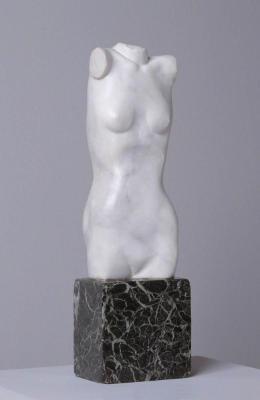Fragmentary Modernisms: The Classical Fragment in Literary and Visual Cultures, 1896-1950
UK Research and Innovation Project supported by an AHRC Leadership Fellowship (May 2020-Sept. 2022)
PI: Professor Nora Goldschmidt , Department of Classics and Ancient History, University of Durham
 (Sappho, Fragment 44, on a damaged papyrus found at Oxyrhynchus (Al-Bahnasa) in Egypt, published in 1914. Picture credit: The Egypt Exploration Fund, Public domain, via Wikimedia Commons)
(Sappho, Fragment 44, on a damaged papyrus found at Oxyrhynchus (Al-Bahnasa) in Egypt, published in 1914. Picture credit: The Egypt Exploration Fund, Public domain, via Wikimedia Commons)
 Fragmentary Modernisms investigates how our idea of ‘the classical fragment’ has been shaped by the dialogues between classical scholars and modernist artists and writers in the first half of the twentieth century.
Fragmentary Modernisms investigates how our idea of ‘the classical fragment’ has been shaped by the dialogues between classical scholars and modernist artists and writers in the first half of the twentieth century.
The fragment is so crucial to modernist art and writing that it has become a cliché. Yet the popularity of the form is not usually connected by scholars of modernist studies with classical reception. On the other side of the disciplinary divide, classicists have long been aware that the period roughly covering the first half of the twentieth century witnessed some of the most prolific breakthroughs in the discovery and dissemination of the fragmentary remains of Graeco-Roman antiquity. But those breakthroughs are rarely linked with the parallel interests of modernism. Working across what is often seen as a ‘traumatic breach’ between modernism and classical scholarship, Fragmentary Modernisms unravels the complex networks of influence between modernists and classical scholars that have helped to co-create the modern concept of the ‘classical fragment’ and the legacy of those networks now.
(‘Torso’, Henri Gaudier-Brzeska (1914): photo credit: Tate)
Monograph
Fragmentary Modernism: The Classical Fragments in Literary and Visual Cultures, c.1896-c.1936 will be published in the ‘Classical Presences’ series with Oxford University Press in 2023/24.
Talking Fragments
The project workshops (Talking Fragments I) and (Talking Fragments II) provided a platform for interprofessional dialogues surrounding the classical fragment today. Inspired by the dialogues ‘across the breach’ between classical scholarship and modernist artistic practice in the first half of the twentieth century, they trailed the spotlight to contemporary encounters with the fragment and fragmentation (broadly defined) as a mediator of classical antiquity. Participants included representatives from the British Library working on uniting lost pieces of material texts across continents, the Newcastle-based artist Catrin Huber , who has produced installations on site in Pompeii and Herculaneum, and the poet and writer Josephine Balmer , whose recent collection, Ghost Passage, brings to life the fragments of lost voices preserved on inscribed objects from Roman London.


/prod01/prodbucket01/media/durham-university/departments-/classics-and-ancient-history/47302-3941X1553.jpg)